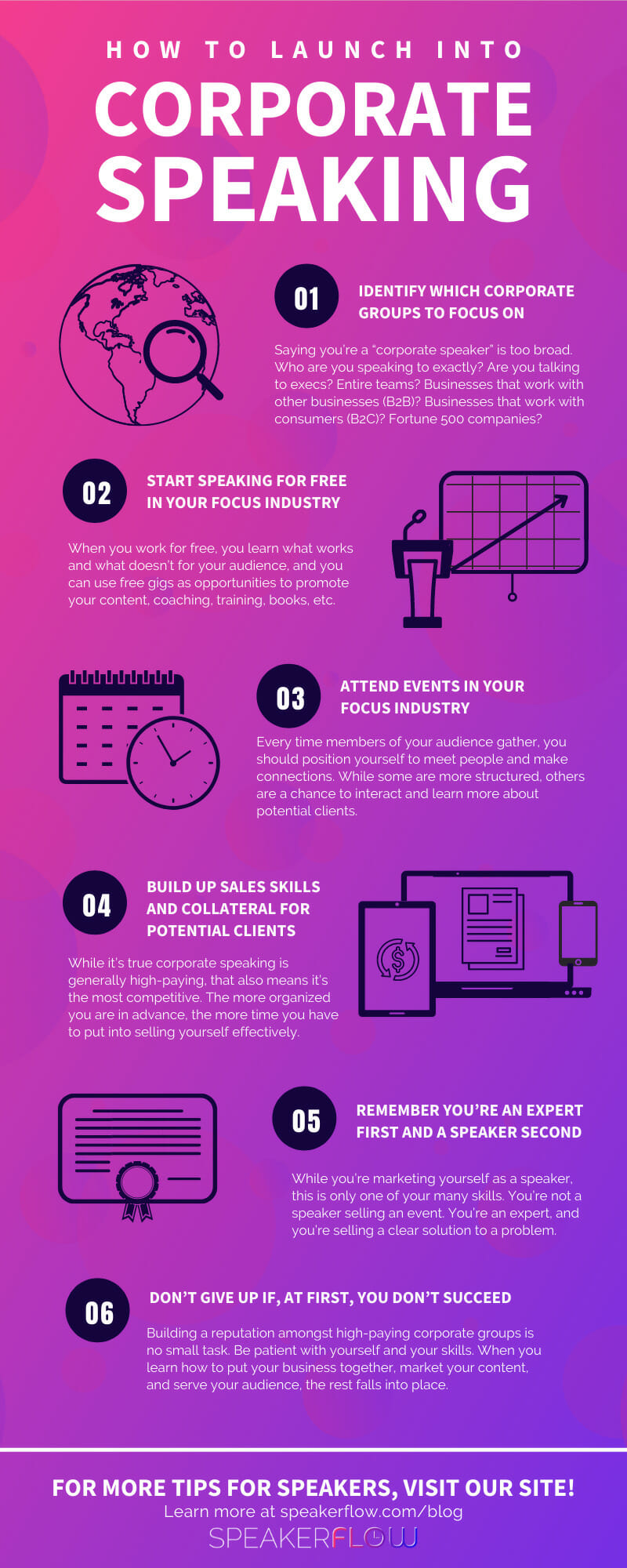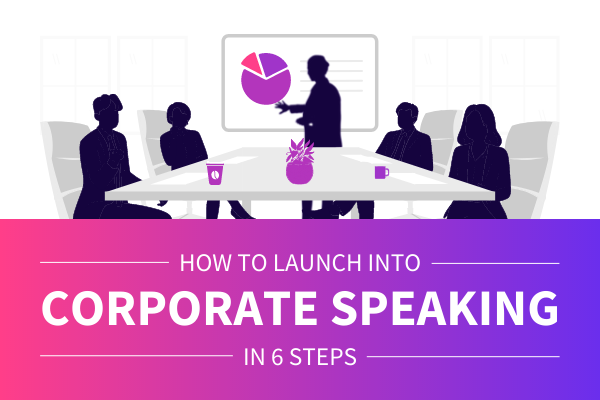Are you thinking of getting into corporate speaking? If so, it’s not always clear how to get started. Corporate speakers, sometimes also called motivational speakers, empower workers at organizations to be more productive. They encourage mindfulness, modern strategies, and action-driven ways to succeed in an entertaining, approachable way.
However, if you want to launch into corporate speaking, it can be easier said than done. This is a highly competitive space. Everyone thinks they have something important to say, but only a few truly stand out as thought leaders. Not only do you need killer self-confidence, but you also need to know how to sell yourself both on and off the stage. Unless you’re a mega-celebrity, it’s not realistic to expect opportunities to fall into your lap.
While being an amazing speaker is a great first step, it’s not the only step. Like any revenue stream, you need to treat your practice as a business. That means knowing the best strategy to build your speaking career from scratch. Amazing speakers come from anywhere, but they don’t happen overnight.
Luckily, you have a team of experts on your side. You don’t need any fancy experience or degrees to get started. Still, you need to be a master of leveraging your own know-how and credibility to make the most of your expertise. In this guide, we’ll share how to launch your corporate speaking gig in 6 steps. No matter where you’re starting from, you can book your first (or tenth) speaking engagement with these steps.
Identify which corporate groups you want to focus on.
First, if you don’t know who you’re marketing to, you’re going to have a hard time getting started. Saying you’re a “corporate speaker” is too broad of a statement. Who are you speaking to exactly? Are you talking to execs? Entire teams? Businesses that work with other businesses (B2B)? Businesses that work with consumers (B2C)? Fortune 500 companies?

In other words, you need to build a profile specifically for the people you want to speak for. You might not be able to jump into this level right away, but your eye should always be on the prize. Not sure to begin? What’s a topic you could talk about for 60+ minutes with little preparation? This is where your passion lies. Now, what audience is the best fit for this type of content?
For example, you might be an absolute guru when it comes to referral marketing. This could position you to speak to marketing execs, sales teams, or B2C specialists. From there, you can break down your topic even further, carving a clear niche for yourself in the corporate space. The more specific you are on the corporate groups you want to focus on, the easier it is to find people who want to hire you.
When do you know that you found the right niche for your speaking? Ask yourself these questions:
- Recognition: Is your audience easy to identify?
- Accessibility: Is your audience reasonably accessible?
- Need: Is this an underserved market?
- Size: Is your audience large enough that you can actually make money selling your speaking services?
- And, above all: Do you understand your target audience?
If you can’t answer yes to all of the above, it might be time to hit the drawing board again. When in doubt, just get started. You’ll likely shift your target niche as you grow and learn. As long as you know who you’re talking to, you’re ready to move on to the next step.
Start speaking for free in your focus industry.
Second, while it might not sound glamorous, you have to face the reality that you won’t likely get paid right away. It’s true that free speaking gigs aren’t nearly as exciting, but that’s not really the point. This is an opportunity to share your skills, connect with others, and network. It’s all about getting your foot in the door (or your hand on the mic).

Every time you step on a stage, you could be speaking to a potential client. Unpaid gigs often lead to paid gigs in the future, sometimes with the same company. In addition, you can use your speaking as an opportunity to promote your content, including coaching, training, or books. This means it can turn into an income opportunity with the right mindset. Most speakers don’t rely solely on gigs to make money. In fact, this isn’t recommended. It’s a better idea to broaden your income streams, using other methods to make sure you don’t run into any dead ends.
At the very least, speaking for free expands your reach. If people aren’t exposed to your ideas, you’ll never launch into corporate speaking. You can’t be a thought leader from the comfort of home. By engaging with people face-to-face, you build valuable experience. Every accomplished speaker has to start from somewhere.
When you work for free, you learn what works and what doesn’t for your audience. This is a blessing in disguise. Some jokes you might have thought were absolute hits might completely fall flat. You might stumble over a few points. In other words, you become a more skilled speaker. As always, you can use this as a chance to solicit feedback from your clients and audience, leading to better experiences in the future.
Attend events in your focus industry.
Next, you can’t exist in a bubble if you want to get into the world of corporate speaking. You need to be active in your industry. Once you’ve chosen a focus industry, you need to become a networking guru. With a reported 85% of gigs filled through networking alone, this is one of the most important things you can do.

Each time you attend an event in your industry, you network and learn. You meet face-to-face with members of your audience. You learn about their challenges, triumphs, and concerns. In turn, you’re prepared to pitch them and serve them. When they hire you, you’ll feel confident enough to hit the ground running.
No thought leader got to the top alone. It’s always a group effort, and collaboration has to start somewhere. When you attend events, you can collect contact details for potential clients, get business cards, and build a list for following up. Who knows what this might lead to? With that in mind, here are the types of events to consider attending:
- Seminars and conferences
- Trade shows
- Executive retreats
- Community events
- Product launches
- Happy hour meetups
- Workshops
- Community service groups
Each of these events has its own strengths, so don’t limit your options. Every time members of your audience gather, you should position yourself to meet people and make connections. While some are more structured, others are a chance to interact and learn more about potential clients.
Build up sales skills and collateral for potential clients.
Fourth, you need to always build your sales skills and collateral. Though “sales” skills often get a bad rep, it doesn’t have to be that way. While it’s true corporate speaking is generally high-paying, that also means it’s the most competitive. The more organized you are in advance, the more time you have to put into selling yourself effectively.

As the saying goes, sales is a numbers game. You’re not going to knock it out on the first try (most likely). You’ll need to practice, practice, and practice even more if you want to make perfect. To begin, focus on building your collateral. It only takes 27 seconds to make a good first impression, and 7 in 10 people form a first impression before someone even opens their mouth. This means you need the right tools at your disposal to hit the ground running.
If you want to break into corporate speaking, make sure you have these:
- Website: First, you need a speaker website. This makes you look professional, reliable, and marketable in the digital age.
- Speaker profile: This is a quick rundown on the type of speaking you do, your audience, and your past work. In other words, it’s a resume of your experience.
- Video clips: A short video reel is a great way to show rather than tell. It’s easy to say you’re a great speaker, but a video is worth a thousand words.
- Testimonials or past work: In the corporate speaking world, testimonials carry a lot of weight. If you’ve worked for other businesses in your industry, make this known.
- Business cards: Of course, any professional needs business cards. These should include links to your website and contact information.
When you have this ready in advance, there’s no struggling to get things together later on. It’s important to be organized and prepared from the start, no matter what level you’re at. Of course, the biggest asset of all isn’t physical at all. It’s confidence.
Remember you’re an expert first and a speaker second.
Another important thing to keep in mind is that you’re an expert first and foremost. While you’re marketing yourself as a speaker, this is only one of your many skills. At the forefront, you’re a thought leader in your industry. In other words, you’re not a speaker selling an event. You’re an expert, and you’re selling a clear solution to a problem.

It’s easy to get trapped in the idea of selling “motivation” or “inspiration,” but this isn’t actionable. Instead, focus on how you can address the real-world needs and concerns of your audience. This is how you demonstrate real value and land gigs. When you’re trying to be a thought leader within an industry, you need to have a unique perspective.
As an expert, you’re actively engaging with your community. You create new content, share trends, and celebrate industry-wide milestones. With 60% of marketers creating at least one piece of content each day, you can’t afford to stay silent. Consistency is key, and you have to focus on creating content your audience wants to consume. When you’re sharing value-rich materials, you’re more than a speaker. You’re a leader. Whether you create informative blog posts, infographics, or podcast episodes, each piece matters for your audience.
When you position yourself as a thought leader, you build trust. You’re not just someone selling your speaking gigs. You’re an active member of the community. More importantly, you’re invested in your audiences’ challenges. You want to help them succeed, and you create content that goes beyond what you’re selling. Always position yourself as an expert first.
Don’t give up if, at first, you don’t succeed.
Last but not least, if at first you don’t succeed, try, try, try again. Building a reputation amongst high-paying corporate groups is no small task. Always be patient with yourself and your skills. Instead of worrying about sales and cold outreach, build your own skills. When you learn how to put your business together, market your content, and serve your audience, the rest falls into place.

If you’re wondering whether now is the time to launch into corporate speaking, the answer is yes. Businesses of all shapes and sizes are looking for leaders to drive innovation and solve some of the biggest challenges in today’s world. Things are moving quickly. If you’re an innovator and creative thinker, now is the time to stay light on your feet.
Like all aspects of business, launching into corporate speaking takes hard work and determination. There are no shortcuts or magic tricks. Stay open-minded about your process, and always be open to collaboration and learning new things. Flexibility gets you far in this space, especially when starting with corporate speaking.
Finally, if you wish to launch yourself as a speaker, be proactive. Don’t wait for opportunities to fall into your lap (Hint: they won’t). Instead, go into the world and make things happen. When you’re engaging with your industry, networking, and building yourself, people take notice. By looking for solutions, you become a natural thought leader. You’re not going to win every gig, and that’s okay. It’s all about trusting the process and refusing to give up. Soon, the pieces fall into place.






